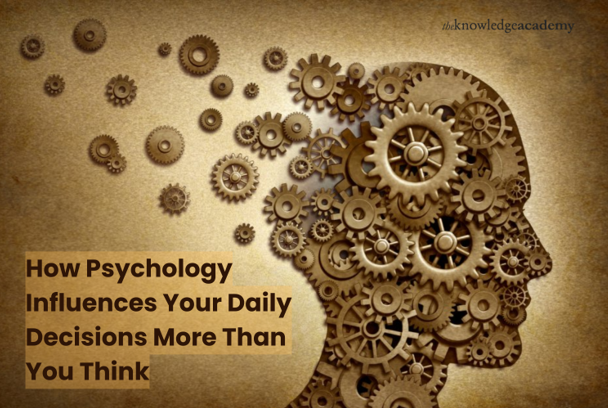
Have you considered how psychology shapes your daily life experiences, actions, and thoughts? What is Psychology? In your journey through life, we make decisions, from the mundane to the life-altering, which is deeply influenced by psychological factors. Understanding these influences enhances our self-decisions and empowers us to make decisions that align with our goals and values in life. Mental Health Training, encompassing techniques to bolster emotional resilience and cognitive clarity, plays a vital role in your daily life decisions.
Table of Contents
- Cognitive Biases and Decision Making
- Emotional Influence on Decision Making
- Behaviour Economics and Decisions insights
- Breaking or Forming Habits
- Influence of Stress on Mental Health and Coping Techniques
- Recognising Creative Potential
- Psychology in Health
- Psychology in Education
- Social Interactions
- Conclusion
Cognitive Biases and Decision Making
Psychological research has illuminated numerous cognitive biases that subtly shape your decision–making processes. These biases, such as confirmation biases or availability heuristics, can affect your judgment and decision-making. Recognising these biases helps you make more informed choices in your everyday life.
Emotional Influence on Decision Making
Your emotions are closely connected to your mental health. How you think, and feel, can affect your metal health and how you feel overall. Techniques like mindfulness and managing your emotions can help you feel better in your daily life decision making.
Behaviour Economics and Decisions insights
Behaviour Economics merges psychology with economic principles to explore how individuals make decisions in various settings. Behavioural economics reveals how psychological factors shape your decisions. By understanding these influences, like biases and heuristics, you can see why you make confident choices and improve your decision-making. This insight helps you make more thoughtful and practical choices daily.
Breaking or Forming Habits
Psychology provides a deep understanding of how habits are established and how they can be adapted. Breaking dangerous habits or forming positive ones becomes achievable with this knowledge. Whether it’s eating healthier, quitting smoking, or being more productive, psychology can provide procedures to change habits effectively.
Influence of Stress on Mental Health and Coping Techniques
Stress is an unavoidable part of life, a fact that psychology acknowledges and provides tools to manage. Chronic stress can lead the way to mental health issues, making it essential to learn effective stress management strategies. From relaxation strategies to time management, psychology offers a range of coping techniques that can help you bring down stress and improve your overall Mental Health.
Recognising Creative Potential
Psychology can unlock your creative potential by offering insights into the creative process and providing strategies to overcome creative blocks. By understanding the psychological aspects of creativity, artists, writers, or problem-solvers can learn techniques to bypass mental obstacles and enhance their inventive capabilities. Embracing psychological principles can lead to a more practical approach to creativity, enabling you to tackle challenges with renewed inspiration and clarity.
Psychology in Health
The mind and body are deeply interconnected, and psychology plays a significant role in managing physical health conditions. Techniques such as biofeedback and relaxation can positively impact health outcomes by addressing mental and physical aspects. Psychology helps elucidate how psychological factors can manifest as physical symptoms, highlighting the importance of recognising psychosomatic disorders. Understanding these connections is essential for a comprehensive approach to health and well-being.
Psychology in Education
Understanding the psychology of learning can improve your educational experiences. Strategies like active learning, spaced repetition, and retrieval practice can enhance knowledge retention. Teachers and students benefit from knowing how psychological factors influence classroom dynamics and performance.
Social Interactions
The way you think and feel and how you connect with people. Recognising social signals, empathy, and understanding communication patterns can help you form better relationships. Your psychology also shapes how you communicate, so improving your ability to express yourself and listen attentively can enrich your interactions and make them more significant.
Conclusion
In conclusion, psychology profoundly influences our daily decisions, often in ways we might not fully realise. By understanding cognitive biases, emotional drivers, social influences, and the effects of daily life decisions, you can become more mindful of how these factors shape your choices. With this awareness, you can take steps to make more thoughtful and deliberate decisions, leading to better outcomes in your daily lives.

















Follow Us